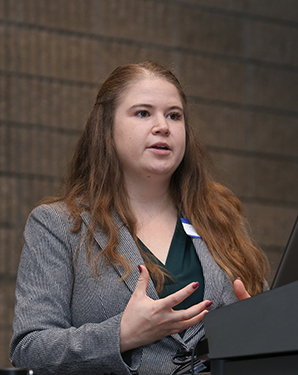Adverse childhood experiences, overdose and suicide are related public health challenges that are often addressed separately. APHA and the Centers for Disease Control and Prevention have partnered on a program that approaches these issues collaboratively, under the assumption that a siloed approach is inadequate.
“Greater impact happens when there is alignment between policy, funding and programs that address these issues together, rather than some current efforts that focus on each issue individually,” said Rachel Ward, acting team leader for strategic partnerships at CDC’s Injury Center, at a session Saturday at the 2023 APHA Annual Meeting and Expo.
Nearly 65% of adults have experienced a traumatic childhood event, such as losing a parent, being bullied in school or child abuse, Ward said at the session “Envisioning a Coordinated Approach to Injury and Violence Prevention.” Studies show that adults with traumatic childhoods are at heightened risk of suicide ideation and opioid abuse.
 ACEs can impact people’s physical, mental, behavioral and emotional health, Ward said. Moreover, an adult with ACEs also is more likely to endure unintentional injury, unintended pregnancy and complications, infection from a sexually transmitted disease, and having a low education and low income as an adult.
ACEs can impact people’s physical, mental, behavioral and emotional health, Ward said. Moreover, an adult with ACEs also is more likely to endure unintentional injury, unintended pregnancy and complications, infection from a sexually transmitted disease, and having a low education and low income as an adult.
In addition, health inequities contribute to disparities in exposure to ACEs, overdose and suicide, said Mighty Fine, APHA’s associate executive director of public health practice and policy. From 2020 to 2021, for example, drug overdose deaths rose 47% for Native Hawaiians/Pacific Islanders, 23% for Black people and 20% for Hispanics in the U.S., CDC says, far higher than for white people.
Fine talked about how the social determinants of health impact all three issues. America tends to embrace the myth of the self-made individual, ignoring the social, economic and other factors that create an uneven playing field for people. Fine said we must tackle root causes of each issue to disrupt the systems and other factors that increase the likelihood of ACEs, overdose and suicide.
During the session’s second half, attendees broke into groups to talk about overlapping concerns, strategies and policies. Brought up in the discussions were increasing understanding of cause and effect, increasing investment in research on what works, and implementing field-tested strategies adapted for specific cultures.
A lot of discussion centered on improving messaging and communication with decisionmakers and funders and across health fields.
Darrell Armstrong, pastor and CEO of Shiloh Baptist Church in Trenton, New Jersey, said the approach requires the three C’s — “collaboration, cooperation and communication.”
The session’s main message was that a coordinated, intersectional approach can provide better insight and interventions for ACEs, overdose and suicide.
“Public health is uniquely situated to address all three issues together,” Fine said.
Photo: Rachel Ward. Photo courtesy EZ Event Photography.